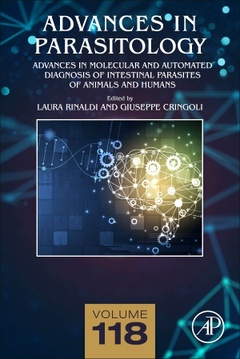Description
Advances in Automated Diagnosis of Intestinal Parasites of Animals and Humans
Advances in Parasitology Series
Coordinator: Stothard Russell
Language: English
Subject for Advances in Automated Diagnosis of Intestinal Parasites...:
Publication date: 09-2022
186 p. · 15.2x22.8 cm · Hardback
186 p. · 15.2x22.8 cm · Hardback
Description
/li>Contents
/li>Biography
/li>Comment
/li>
Advances in Parasitology, Volume 116, the latest release in this ongoing series, includes medical studies of parasites of major influence, along with reviews of more traditional areas, such as zoology, taxonomy and life history. Chapters in this update include Landscape analysis of available diagnostic tests for STH: how far are we from the WHO TPPS? and Challenges and solutions for the diagnosis of animal and human Strongyloides stercoralis infection.
1. Landscape analysis of available diagnostic tests for STH: How far are we from the WHO TPPS 2. Challenges and solutions for the diagnosis of animal and human Strongyloides stercoralis infection
Professor David Rollinson is a Merit Research Scientist at the Natural History Museum in London, where he leads a research team in the Wolfson Wellcome Biomedical Laboratories and directs the WHO Collaborating Centre for schistosomiasis. He has had a long fascination with parasites and the diseases that they cause, this has involved him in many overseas projects especially in Africa. He is on the WHO Expert Advisory Panel of parasitic diseases, the editor of Advances in Parasitology and a former President of the World Federation of Parasitologists. His research group uses a multidisciplinary approach, which combines detailed molecular studies in the laboratory with ongoing collaborative studies in endemic areas of disease, to explore the intriguing world of parasites in order to help control and eliminate parasitic diseases.
Prof. Russell Stothard is Chair in Medical Parasitology at the Liverpool School of Tropical Medicine, UK
Prof. Russell Stothard is Chair in Medical Parasitology at the Liverpool School of Tropical Medicine, UK
- Informs and updates on all the latest developments in the field of parasitology
- Includes medical studies of parasites of major influence
- Features reviews of more traditional areas, such as zoology, taxonomy and life history which will help shape current thinking and applications
© 2024 LAVOISIER S.A.S.
These books may interest you

Advances in Parasitology 182.55 €

Advances in Parasitology 182.55 €

Advances in Parasitology 182.55 €

